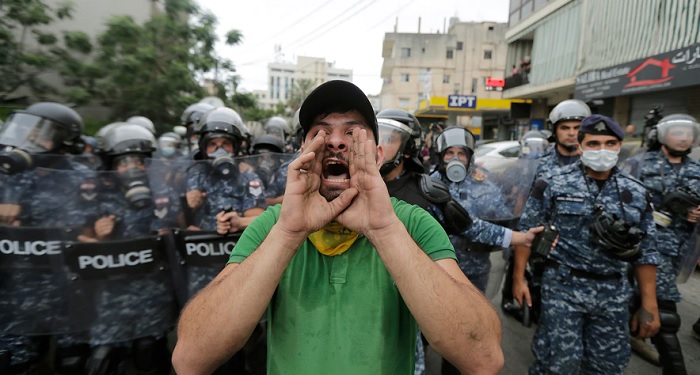
New U.S. sanctions targeting the Syrian government appear to also undermine Hezbollah in Lebanon. Experts say the measures are alienating Hezbollah from its political allies in Lebanon and weakening its usage of state institutions to assist the Syrian regime.
The sanctions, introduced on June 17 and known as the Caesar Syria Civilian Protection Act, have been described by the group’s leader Hassan Nasrallah as an “economic war” that aims at “starving both Syria and Lebanon.” He has called on the Lebanese government to ignore them.
While the sanctions may not be devastating for Hezbollah, they could deter other parties in Lebanon’s governing coalition from following the Iran-sponsored group’s wish to improve ties to Bashar al-Assad’s administration, according to Hanin Ghaddar, a senior fellow at the Washington Institute.
“Hezbollah has been calling the Lebanese government to normalize Lebanon’s relations with the Assad regime,” Ghaddar told VOA. But, he said, none of Hezbollah’s allies “wants to challenge Caesar Act, especially when there are negotiations going on with the international community to salvage the country from its devastating economic crisis.”
Hezbollah has been classified by the U.S. as a terrorist organization since 1997. The group is sanctioned under the 2014 Hezbollah International Financing Prevention Act, which prevents entities associated with Hezbollah from gaining access to international financial and logistics networks and blocks its ability to fund global terrorist activities. The U.S. Treasury earlier this year announced further sanctions, blacklisting 15 Hezbollah-affiliated entities in Lebanon.
Political control
Lokman Slim, a Beirut-based analyst, told VOA that Hezbollah has been working for years to strengthen its infiltration of the Lebanese state and army by weaving a network of alliances across the Lebanese multi-sectarian spectrum.
The group’s control over the political scene in Lebanon reached its peak in 2016, when it successfully backed Michel Aoun, a Maronite Christian and head of the Free Patriotic Movement party, to become president.
However, the group’s allies are now starting to distance themselves from Hezbollah to guarantee their political survival, said Slim.
“When Hezbollah’s main ally (Shia) speaker Nabih Berri champions the defense of the banking sector, and when voices from within the Free Patriotic Movement, the party of President General Michel Aoun, start calling into question the feasibility of blindly following Hezbollah, and when Patriarch Rahi, the highest Christian authority in Lebanon, calls on the U.N. to help Lebanon assert its neutrality, we can’t say that Hezbollah is in its glory days,” he said.
Hezbollah’s transactions
In addition to financial support from Iran, Hezbollah has been using smuggling routes across Lebanon’s border with Syrian, while at the same time exploiting Lebanese state institutions to collect revenue.
Experts say the Caesar Act might not curb Hezbollah’s underground activities, but it will disrupt the group’s ability to use those state institutions to support the Syrian government.
“Hezbollah is forcing the Lebanese government, through the Lebanese central bank, to import, at a subsidized price, quantities of some basic goods, mainly fuel, wheat, and medical supplies, which exceed Lebanon’s needs. Portions of the excess goods are forwarded to Syria via its traditional smuggling routes,” said Slim.
Hezbollah observers say that despite its threats, the group may not be ready to increase tensions with the U.S., especially when its main backer Iran is facing its own harsh sanctions.
“Hezbollah is tied by the current financial situation in Lebanon, and they know that any escalation when it comes to the U.S. will be dangerous,” Ghaddar of the Washington Institute said. She said the priority for Hezbollah and Iran now is to wait and try to survive the upcoming few months until the U.S. elections.
US aid
While trying to curb Hezbollah, the United States has been providing military assistance to the Lebanese Armed Forces (LAF) since 2006, including arms, training and advisory support.
The U.S. CENTCOM commander Gen. Frank McKenzie, earlier this month visited Beirut, where he stressed the need for continued U.S. cooperation with the Lebanese army to preserve the country’s stability and sovereignty. The visit came just after the army announced it had shut down three routes used to smuggle stolen vehicles and other goods into Syria.
The United States has been the biggest donor to Lebanon, providing $1.8 billion in humanitarian funds, since the start of the Syrian refugee crisis. Last year alone, the U.S. government contributed $750 million to Lebanon.
Meanwhile, Lebanese officials have frequently said they welcome any improvement in relations with the U.S., especially as they struggle to rescue their economy.
Impact on economy
Lebanon is facing its worst economic crisis since the end of its 15-year civil war in 1990 and Lebanese officials say they fear the U.S. sanctions on Syria could exacerbate the crisis.
Last month, during an international conference on humanitarian assistance for Syria held in Brussels, Lebanese Prime Minister Hassan Diab appealed for international donors to help his country escape the negative consequences of the sanctions.
Officials in Washington say the Caesar Act does not target Lebanon’s legitimate economic activities and will have no impact on the Lebanese people.
However, “If the Lebanese government or Lebanese businesses were to enter into transactions with the Assad regime to purchase Assad regime fuel, then that’s a very risky transaction, and that would expose them to sanctions,” warned U.S. Deputy Assistant Secretary Joel Rayburn on June 17.
 Eurasia Press & News
Eurasia Press & News



